

Nicaragua gives Chinese firm contract to build alternative to Panama Canal. Nicaragua has awarded a Chinese company a 100-year concession to build an alternative to the Panama Canal, in a step that looks set to have profound geopolitical ramifications.
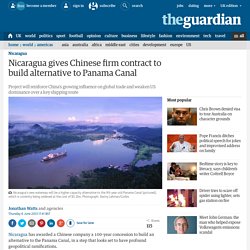
The president of the country's national assembly, Rene Nuñez, announced the $40bn (£26bn) project, which will reinforce Beijing's growing influence on global trade and weaken US dominance over the key shipping route between the Pacific and Atlantic oceans. The name of the company and other details have yet to be released, but the opposition congressman Luis Callejas said the government planned to grant a 100-year lease to the Chinese operator.
The national assembly will debate two bills on the project, including an outline for an environmental impact assessment, on Friday. Nicaragua's president, Daniel Ortega, said recently that the new channel would be built through the waters of Lake Nicaragua. Additional reporting by Gareth Richards. Renewing America » Obama Slapdown on Chinese Wind Deal Sends Wrong Message. Wind turbines operate at a wind farm near Milford, Utah (George Frey/Courtesy Reuters).
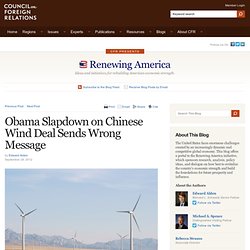
President Obama has become the first president in 22 years to issue a formal order blocking a foreign investment into the United States on national security grounds. The decision, which denies the acquisition of a small Oregon wind farm project by a Chinese-owned company, will unfortunately be seen as yet another signal – this time from the highest possible level — that the United States does not really want Chinese investment.
And for an economy still struggling to create jobs, that’s the wrong signal to send. The action by Obama is the first presidential rejection of a foreign acquisition on security grounds since President George H.W. Romney stirs up anti-China vote. US Republican presidential candidate Mitt Romney continues to push a tough stance toward China as the US elections draw close, but observers downplayed his sharp rhetoric as pandering to voters.
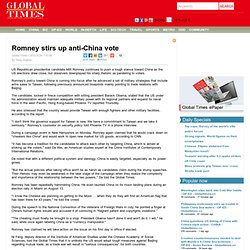
Romney's policy toward China is coming into focus after he advanced a set of military strategies that include arms sales to Taiwan, following previously announced blueprints mainly pointing to trade relations with Beijing. The candidate, locked in firece competition with sitting president Barack Obama, stated that the US under his administration would maintain adequate military power with its regional partners and expand its naval force in the west Pacific, Hong Kong-based Phoenix TV reported Thursday.
He also stressed that the country would provide Taiwan with enough fighters and other military facilities, according to the report. "I don't think the governor support for Taiwan is new. Mitt Romney vu par la Chine. Paru dans leJDD Pékin montre une certaine inquiétude autour d'une élection éventuelle de Romney.
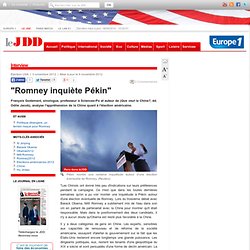
(Reuters) "Les Chinois ont donné très peu d'indications sur leurs préférences pendant la campagne. Ce n'est que dans les toutes dernières semaines qu'on a pu voir monter une inquiétude à Pékin autour d'une élection éventuelle de Romney. Lors du troisième débat avec Barack Obama, Mitt Romney a subitement mis de l'eau dans son vin en parlant de partenariat avec la Chine pour montrer qu'il était responsable.
Il y a deux catégories de gens en Chine. Chen’s friend: U.S. conveyed Chinese threat against wife. Chen Guangcheng's friend Bob Fu, president of ChinaAid, told a congressional commission Thursday that Chen only agreed to leave the U.S.
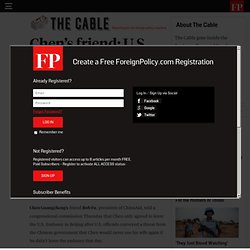
China-US: Power in perspective. As Michael Beckley acknowledges in his reply to Mark Thirlwell, it is hard to say definitively whether America is declining economically relative to China, because it depends what you measure. On some measures it is, and on others it's not. So the next question is: which measures should we pay attention to? And that depends on why we are interested. In the present debate, flowing from Michael's excellent essay in International Security, we are interested in what the economic trends mean for America's strategic and political power, particularly in relation to China.
And we are interested in that primarily because of the implications of shifts in relative power for America's management of its relationship with China. So we have three questions to answer before we can draw strategic policy conclusions from the economic data. US arms sales to Taiwan: impact on Sino-American relations. Author: Carlyle A Thayer, UNSW Canberra.
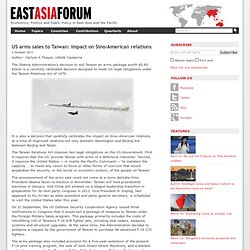
U.S. Challenges China on Island Chain. Why China Won’t Engage. Global Security Newswire - U.S. Wants Nuclear Force Talks With China. PrintShareEmailTwitterFacebookLinkedIn The United States hopes to foster "strategic stability" with China through talks on the two nations' nuclear arsenals and deterrence postures, Kyodo News reported Saturday (see GSN, Aug. 18).
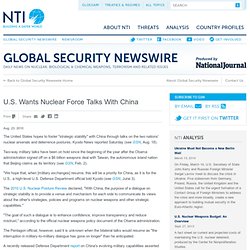
Two-way military talks have been on hold since the beginning of the year after the Obama administration signed off on a $6 billion weapons deal with Taiwan, the autonomous island nation that Beijing claims as its territory (see GSN, Feb. 2). "We hope that, when [military exchanges] resume, this will be a priority for China, as it is for the U.S., a high-level U.S. Defense Department official told Kyodo (see GSN, June 3). 2005 : The Future ofU.S.-China Relations : Is Conflict Inevitable ? (Aaron L. Friedberg)